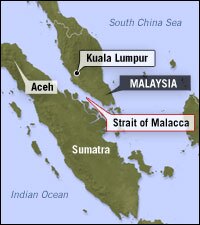With our free press under threat and federal funding for public media gone, your support matters more than ever. Help keep the LAist newsroom strong, become a monthly member or increase your support today.
Writer Tracks Modern-Day Pirates in Malaysia

Today's pirates are more likely to have Global Positioning Systems than parrots perched on their forearms.
In Malaysia's Strait of Malacca, where one-fifth of the world's sea trade is centered, piracy is a high-tech enterprise. Since 2002, more than 250 pirate raids have been reported in the waterway — through which one-third of the world's crude oil shipments pass.
Peter Gwin, a writer for National Geographic, met and even trained with pirates who work the waterway. His article, called "Dark Passage," is in the current issue of the magazine, with accompanying photos by John Stanmeyer.
Gwin learned quickly that pirates, called lanun (la-noon) in the Malay language, generally operate in small bands and use wooden boats outfitted with powerful outboard engines to raid tankers that ply the strait.
Many raids are often aided by someone on the inside — sometimes a captain — who tips pirates off on the ship's position and cargo load. The waterway, which is dotted with uninhabited mangrove islands, is nearly unsecurable, and has been a focal point for piracy for centuries.
"This is a place that piracy has been since the time of Marco Polo," Gwin said. "And I wanted to see if there was sense of this tradition — you know, 'We're carrying on this great tradition from this part of the world' ... And there's a little bit of that."
Gwin interviewed imprisoned pirate Johan Ariffin, whose raid on the tanker Nepline Delima was thwarted by police. The ship was carrying $3 million in diesel fuel when Ariffin and nine accomplices hijacked the ship. Though they tied up its crew, one crew member escaped and summoned police. In a jailhouse interview, Ariffin pointed Gwin to a network of men who regularly raided boats on the strait.
After successful heists, Gwin learned that many pirates celebrated their newfound wealth with trips to Batam, an Indonesian island just south of Singapore, where they spent their newfound wealth in karaoke bars and low-rent brothels. Many of the pirates Gwin trained with and spoke to used aliases and carried multiple passports. According to the International Maritime Bureau's Piracy Reporting Centre, half of all pirate attacks go unreported. Many shipping companies don't report raids because they don't want bad publicity.
Gwin spoke with Scott Simon about his time in Malaysia and what he learned about modern-day piracy.
Copyright 2022 NPR. To see more, visit https://www.npr.org. 9(MDA1OTI3MjQ5MDEyODUwMTE2MzM1YzNmZA004))







